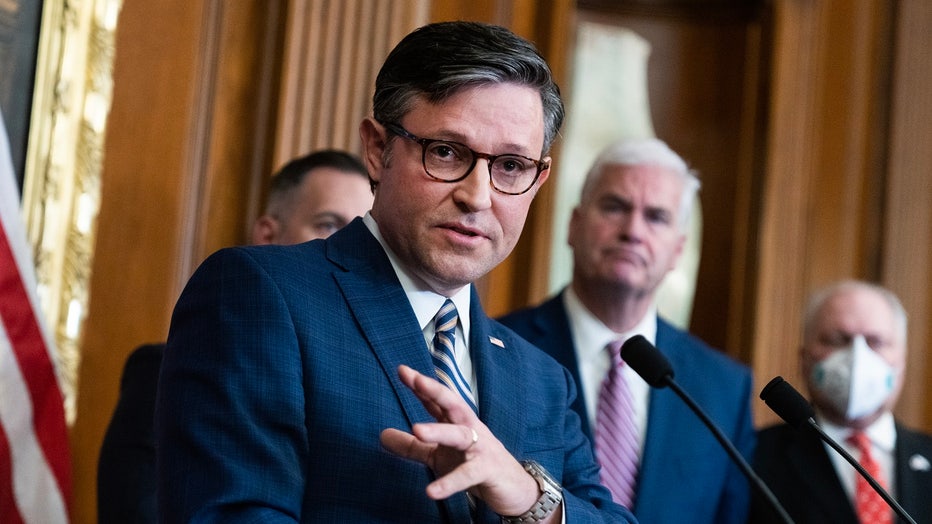Warnock reacts to yet another government shutdown showdown in D.C.
Sen. Warnock on looming government shutdown
The United States is 9 days away from a potential government shutdown and it's unclear whether hard-right House Republicans are willing to compromise on spending cuts. Sen. Raphael Warnock says the Senate has approved several bipartisan spending bills, including millions for projects in Georgia. He says the House should follow suit.
ATLANTA - Lawmakers in the U.S. Capitol are 9 days away from yet another potential government shutdown unless they can find a way to avert it.
It is unclear if hard-right House Republicans are willing to compromise on spending cuts as they demand greater border security as a condition for further support for Ukraine in its fight against Russia.
New House Speaker Mike Johnson, R-La., said Tuesday that Republicans do not want to close things down, but he is well aware that his predecessor, Rep. Kevin McCarthy, R-Calif., was ousted as speaker after compromising with Democrats in September to keep federal offices open.
"We certainly want to avoid a government shutdown," Johnson said at a news conference alongside families with loved ones kidnapped in the Israel-Hamas war.
"It’s a dangerous time around the world right now," he said. "We recognize that, and we’re doing our job."
The Senate has already approved several bipartisan spending bills, including millions earmarked for projects in Georgia. Rep. Rapheal Warnock calls for the House to follow suit.
He spoke about his concerns with FOX 5 senior anchor Russ Spencer in a one-on-one interview over Zoom on Wednesday.
Johnson is facing one of his most difficult tests yet, just two weeks into the job. Rather than lead the House Republicans into a strategy, Johnson appears to be crowdsourcing a way out of the government funding dilemma with his GOP colleagues.
At a closed-door meeting, House Republicans discussed stopgap measures, including a new idea gaining traction: a "laddered" approach that would fund parts of the government until early December and the rest until mid-January, according to Republicans granted anonymity to discuss the private gathering.

Speaker of the House Mike Johnson, R-La., conducts a news conference in the U.S. Capitol with family members of hostages taken by Hamas during the October 7th attack on Israel, on Tuesday, November 7, 2023. Also appearing are, from right , House Majo
The Senate, which is controlled by Democrats, has been working to devise a more comprehensive spending plan that would fund the government at current levels while also considering President Joe Biden’s nearly $106 billion request for supplemental money for Ukraine, Israel, the Asia-Pacific region and border security.
Congress is in this budget-shutdown loop because the House and Senate have failed, as they often do, to pass the dozen individual bills needed to fund the various agencies in the federal government. When the new budget year began Oct. 1, lawmakers agreed to approve funding at the current levels until Nov. 17, to allow time to finish up the work.
To complicate matters this time, Republicans are refusing Biden’s request to support Ukraine in battling Russia unless the president agrees to their demands to bolster security along the U.S. border with Mexico.
House Republicans are cutting money for most departments except the Pentagon, while the Senate also boosts defense and has shifted some resources. Without compromise, the final products have not been sent to Biden to become law.
One of the measures is to reduce the IRS enforcement, something Sen. Warnock says would actually add to the deficit.
Johnson presented several plans to Republican lawmakers at a closed-door meeting, according to lawmakers in the room.
The House’s hard-line conservatives, including many in the Freedom Caucus, mostly favored the two-step "laddered" approach because it would put a tight deadline on Congress to finish up the work and negotiate with the Senate.
But senior Republicans on the House Appropriations Committee warned that it would likely take far longer than to reach an agreement with the Senate on spending levels, especially when an agreement on topline spending that Biden and McCarthy struck is no longer being met.
Lawmakers do not expect any voting until early next week. That puts Congress on a tight deadline to avoid a shutdown.
But House Republicans noted that there is greater consensus around passing a stopgap funding measure than in September, when former McCarthy had to turn to Democrats for support to keep the government open, and then faced the vote to oust him.
The House Republicans spent most of last month struggling to elect a new speaker before settling on Johnson.
The Associated Press contributed to this report

